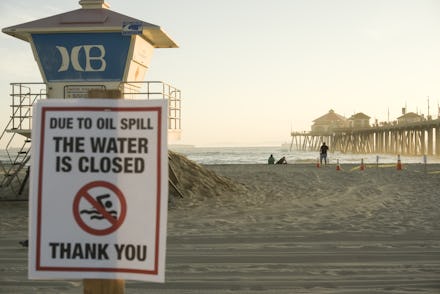An oil spill poured 126,000 gallons of oil into the Pacific Ocean last weekend

Here's a reminder that we don't have to burn fossil fuels in order to destroy the planet with them. A pipeline failure off the coast of Southern California that started Saturday has by now poured at least 126,000 gallons of crude oil into the Pacific Ocean. The spill has caused an environmental disaster across the coast, creating a city-sized slick that has spread across the water, made its way to beaches, and will almost certainly cause irreparable harm to a delicate ecosystem.
According to the Los Angeles Times, the massive spill has been traced to a broken pipeline connected to an offshore oil platform located in federal waters off the coast of Orange County. The pipeline belongs to Amplify Energy, a Texas-based oil company that has a spotty track record for complying with safety rules and regulations. The leak was stopped by Sunday afternoon, but not before it created a 13-square-mile layer of oil floating on top of the water, which is still present despite the efforts of cleanup crews.
Impact from the disaster has already been apparent. Beaches near the affected area have closed, including Huntington Beach, which had to cancel its Pacific Airshow, which was projected to attract nearly 1 million onlookers. There have already been reports of dead fish and birds washing up on shore, and the Los Angeles Times reported that some of the spill has penetrated the safety of the Talbert Marsh, a small ecological reserve that serves as a home to as many as 80 different species of birds. The spill also stretches across an area known as the Pacific Flyway, a route utilized by migratory birds that are traveling from North America to South America. Destruction of the wetlands along this route would make life considerably more difficult for these birds, who are now experiencing loss of friendly habitat and food sources as the oil invades.
Leading the clean up efforts of the spill are the California Department of Fish and Wildlife, the U.S. Coast Guard, Orange County, and Amplify Energy, the company responsible for the spill.
Let's focus on Amplify, briefly. The Houston-based company is the parent company of Beta Operating Company, the firm that is technically responsible for the oil pipeline that appears to be the source of the leak. According to the federal Bureau of Safety and Environmental Enforcement, Beta Operating Company has received 125 noncompliance violations on its offshore oil platforms, including 72 separate violations that required addressing before the company could continue its operations. The firm also received fines totaling $85,000 for violations that led to injuries of its workers. The L.A. Times reported that the firm's former parent company, Memorial Production Partners, declared bankruptcy in 2017, leading to Beta Operating getting acquired by Amplify. While Amplify was supposedly upgrading the infrastructure for Beta's offshore oil operation, it appears the old pipes and lack of compliance finally caught up, and the planet is paying the price.
This spill is a devastating reminder of why it is so important to move away from fossil fuels. Not only does burning them result in warming the planet, but simply extracting and transporting these fuel sources presents a major risk of environmental disaster. This oil spill lasted just one day, but its effects will be felt for decades by the ecosystems that have been infected.